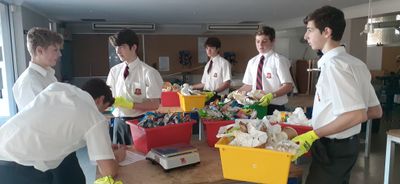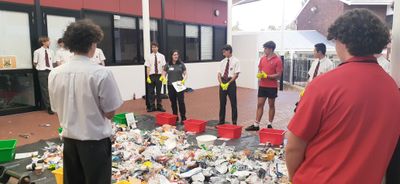Contact

Together, the Sustainability Council and other interested students willing to dive into rubbish accomplished a College Waste Audit on Friday the 17th of September. This not so glamorous research provided an opportunity for the Council to collect data on the type, volume and location of waste across the college. You are probably wondering how this was done, and no students were not just pulling rubbish out of the bins and randomly sorting it — quite the opposite thanks to Rosie from Waste Wise Schools. The Waste Wise schools van pulled up with all the equipment we could ever need: tarps, many many tubs and buckets, tongs, gloves, soap and of course cleaning equipment for the end clean up!
Whilst some were setting up the scene other students were going around selecting a diverse range of bins from across the College. We settled on 7 wheelie bins emptying them onto the tarp for the many hands/tongs to sort through. Emptying the bins onto the tarp was not a pretty sight at all! Waste was sorted into 3 main categories — undegradable, recyclable and organic waste, which within them had separate sections such as snack wrappers, food scraps, paper and cardboard, aluminium, and plastic.
Sorting the waste took roughly a period and went fairly free of too much mess apart from the occasional stray projectile burger inbound for the food scraps bucket. During the sorting process, the boys found it very easy to fill the snack wrapper, plastic and general rubbish buckets already giving some insight before the data had even been collected. Once the mountain of waste was sorted into the various categories the true purpose of the waste audit came about, because after all, nobody wants to just sort rubbish for fun, we began collecting data.

From the data collected, food waste is the largest by weight and then general and plastic waste following closely behind with many little bundles of glad wrap. Surprisingly and even more so shockingly, whole unopened chip packets were discovered, whole packets of Oreos, many whole sandwiches and fruit, as well as drinks and, aside from food, Tupperware containers were also discovered – sorry parents these were not all the disposable kind! This data is hopefully going to be used by the council to pitch to the college systems to put in place to reduce waste, but this responsibility also lies with the students – they are the ones who need to take action on reducing the waste in our College.
So what can you do? It is fairly simple — be responsible consumers, not wasteful, only buy what you will eat and if you don’t eat it - take it home and let your parents know you don’t like certain things rather than throw them out. In short, think before you throw something out – offer it to mates or leave it for another day!


